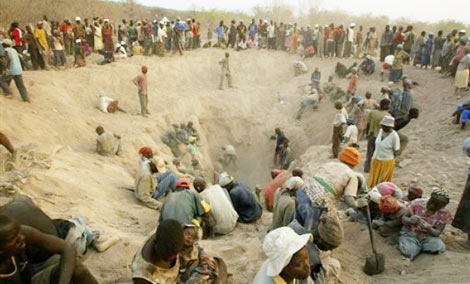President Robert Mugabe's government is expected to open Zimbabwe's diamond sector to increased foreign investment, as it highlighted that its policy would not seek to "nationalise or expropriate private assets".
In a report to investors circulated at the recent United Nations World Tourism Organisation's summit jointly hosted by Zimbabwe and Zambia, the Ministry of Economic Planning and Investment Promotion said the discovery of diamonds in Masvingo highlighted the potential for more opportunities in the sector.
Reports suggest that four diamondiferous kimberlites were discovered in Budzi communal lands in Bikita near the border with Manicaland Province..
A consortium of Chinese and Zimbabwean firms registered as Nan Jiang Africa Resources applied to the Ministry of Mines and Mining Development for a licence to start exploiting the gems. The firm initially wanted to mine tantalite before discovering diamonds.
In the report meant for foreign investors, government said it was buoyed by the discovery, which is likely to consolidate the country's position as a diamond supplier to the international market.
Zimbabwe is currently mining diamonds in Chiadzwa, Marange, said to be home to one of the world's richest diamond deposits.
"Mining activities at Chiadzwa have significantly increased diamond production in the country. The recent discovery of diamonds in Masvingo area further demonstrates the potential for new explorations and the establishment of mining companies in the country," said the report, funded by the UNDP.
"There are also opportunities for diamond cutting, polishing and processing that investors could explore," said the report.
President Robert Mugabe's Zanu-PF party swept to power in a landslide victory in polls held on July 31 on the back of an aggressive economic empowerment programme primarily targeting local control of foreign-owned mining firms.
It is not clear how government would balance its ambition to attract foreign investment with the indigenisation campaign, largely viewed by critics and the opposition as expropriation.
Several reports have indicated that Zimbabwe was among the top 10 growth performers in Africa between 2009 and 2012.
The country registered average growth rates of 8,5 percent between 2009 and 2011.
But growth has been affected by wide-ranging negative macro-economic fundamentals since 2012.
The manufacturing sector is in crisis, and government has been looking up to its vast mineral reserves to arrest the slowdown.
However, global investors have been skeptical about pumping investments in a destination that has escalated threats to force indigenisation on foreign-owned companies.
But the report said Zimbabwe was reviewing its attitude.
"It is not government policy to nationalise or expropriate private assets," it said.
"The focus of government is on broad based economic empowerment whose thrust is to ensure that the majority of Zimbabweans are integrated into the mainstream economy. Investors are urged to actively engage with the government and private sector to promote joint ventures and partnerships," it added.
Diamond mining had been concentrated in the controversial Chiadzwa fields, where four mines have established operations in partnership with the State-run Zimbabwe Mining Development Corporation (ZMDC).
But the ZMDC's presence in the fields has raised the ire of local and international stakeholders, who allege that it has been engaging in "secretive" deals.
The Africa Progress Report (APR) recently fired a broadside at the ZMDC for alleged "secretive" deals.
The ZMDC's involvement in the diamond sector was a "commercial monopolisation" of the industry, according to APR.
In Chiadzwa, the ZMDC controls 50 percent shareholding in three of the four mines operating there, and a 100 percent stake in Marange Resources, the fourth operation exploiting the gems.
Meanwhile, the investors' report said the United Kingdom was the second largest exporter of goods into Zimbabwe in 2012 after South Africa.
Imports from the UK into Zimbabwe totaled $1,2 billion during the period, second only to South Africa's $3,2 billion.
- fingaz
 OK Zimbabwe posts US$17,8 million loss
OK Zimbabwe posts US$17,8 million loss  Hichilema meets Chivayo
Hichilema meets Chivayo  Millions celebrate Diwali festival in India
Millions celebrate Diwali festival in India  Econet Zimbabwe to delist from ZSE
Econet Zimbabwe to delist from ZSE  Gold edges up as traders await guidance
Gold edges up as traders await guidance  Mnangagwa fires Chitando, appoints Polite Kambamura
Mnangagwa fires Chitando, appoints Polite Kambamura  Young Investment Professional (YIP) Graduate Programme 2019
Young Investment Professional (YIP) Graduate Programme 2019 











 Young Investment Professional (YIP) Graduate Programme 2019
Young Investment Professional (YIP) Graduate Programme 2019
Editor's Pick